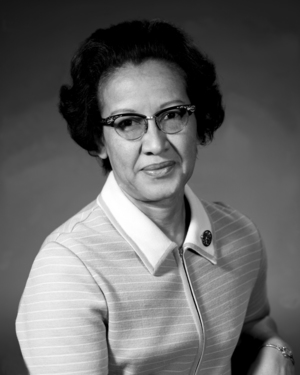
I know I don’t usually comment on the passing of public figures, but since I’ve been trying to highlight scientists of African descent it seemed appropriate to acknowledge that Katherine Johnson left us earlier this week. Johnson was introduced to many of us via the book Hidden Figures and subsequent film. She worked as a computer at NASA, making vital calculations of trajectories and orbits to ensure that astronauts got where they were going–including the moon–and came home again. In the age of smartphone navigation such tasks may sound trivial, but keep in mind that your destination isn’t moving at 2,300 miles per hour (the orbital speed of the moon) relative to your destination. And the electronic computer on the spacecraft had less computing power than your smartphone’s charger. (Yes, I really mean the charger, the little block you plug into the wall and probably don’t even realize has a computer inside.) All of that to say that Johnson and other human computers made essential contributions to the success of our space program.
I also want to continue recognizing scientists who are still with us. Or rather I want to get out of the way so they can tell you about themselves and their work directly. Let’s stay in space for a moment and hear from astronaut Mae Jemison about why she thinks solving the problems of visiting the stars can help us meet more immediate needs as well.
One of those needs is expanding access to clean, potable water. Here you can see engineer Royce Francis as part of a panel discussion on water. Royce is also part of our Emerging Scholars Network, having written a number of posts for this blog, including a series on immigration and an essay on supporting science literacy in the church which can also be found in the Science & Faith book.
Another global challenge is meeting our growing electricity demands without a proportionate increase in fossil fuel consumption. Here’s engineer John Dabiri talking about improvements to wind turbines to maximize the power we can generate from the warmth of our closest star. You might also be interested in this profile of Dabiri when he received a MacArthur Grant, in which he talks about his mentoring work through his church.
James McLurkin also cares about mentoring, as he discusses in the interview below. He has worked on swarm robotics, which focuses on using lots of little simple robots working together to accomplish complex tasks. In the interview he is talking about voice-recognition gadget he developed to encourage kids to get interested in robotics. Don’t miss the LEGO candy dispenser.
Biomedical engineer Audrey Bowden wants to not only make more engineers, but also more disciples of Jesus. She spoke with InterVarsity ministry The Well about that last year. In the video below, she speaks briefly about how she got excited about her field in the first place.
Finally, let’s hear from some biologists. Georgia Dunston was recently profiled by Christianity Today about her work and her faith. Below, she is talking about the future possibilities suggested by genomics and personalized medicine.
And then here’s Rick Kittles elaborating on a topic I discussed briefly a couple of weeks ago: the relationships (and lack thereof) between biology and our social categories of race.
Andy has worn many hats in his life. He knows this is a dreadfully clichéd notion, but since it is also literally true he uses it anyway. Among his current metaphorical hats: husband of one wife, father of two teenagers, reader of science fiction and science fact, enthusiast of contemporary symphonic music, and chief science officer. Previous metaphorical hats include: comp bio postdoc, molecular biology grad student, InterVarsity chapter president (that one came with a literal hat), music store clerk, house painter, and mosquito trapper. Among his more unique literal hats: British bobby, captain’s hats (of varying levels of authenticity) of several specific vessels, a deerstalker from 221B Baker St, and a railroad engineer’s cap. His monthly Science in Review is drawn from his weekly Science Corner posts — Wednesdays, 8am (Eastern) on the Emerging Scholars Network Blog. His book Faith across the Multiverse is available from Hendrickson.

Leave a Reply